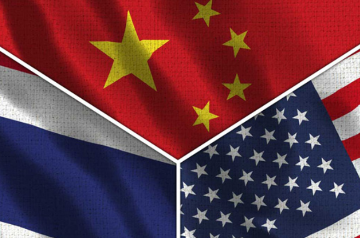
In August 2019, the United Nations Institute for Disarmament Research (UNIDIR) held a conference to discuss the scope of a
gender-responsive Biological Weapons Convention (BWC). The discussion revolved around the
representation of sex and gender in biological warfare based on intentional attacks and examples of natural outbreaks that may influence and impact different genders in different ways.
While gender may be a relatively unintuitive consideration within biological weapons protocols, historically, there has been an incongruent influence on more vulnerable sexes (usually referring to biological females), and this vulnerability is increasing with emerging technologies.
Historical and traditional biological warfare
The
underrepresentation of diverse genders in medicine and biological agent development already makes oppressed and minority genders more vulnerable to biological weapons than their male counterparts.
Historically, women have also been targeted explicitly with biological weapons. In Apartheid-era South Africa, for example, testimony before the South African Truth and Reconciliation Commission (TRC) revealed that biological weapons were used to
assassinate political opponents. Under Project Coast, in the same testimony, a leading scientist admitted to (unsuccessful) attempts at developing serums that would cause
infertility in black women.
While chlamydia can have many outcomes, it is often asymptomatic in women and is categorised as a sexually transmitted disease that impacts women incongruently.
Additionally, Japan experimented with
sexually transmitted diseases against its captives between 1932-1945. Till today,
rape and forced pregnancy are considered
weapons of war, with one of the many lifelong impacts of these being
sexually transmitted diseases.
Likewise, the BWC also outlines chlamydia as a
biological agent/weapon. While chlamydia can have many outcomes, it is often asymptomatic in women and is categorised as a sexually transmitted disease that impacts women incongruently.
Anthrax, a well-known biological agent, reportedly
impacted biological males more than biological females from
1998-2000 in the United States (US). However, the vaccine aimed at protecting against anthrax showed that women had more reactions than men, with no determined cause and almost
twice the reaction risk.
Most recently, the anthrax attacks of 2001 in the US have been classified as the
worst biological attack in US History, resulting in the death of five individuals and seventeen individuals falling critically ill.
While there have been no confirmed cases of biological attacks since the scope for such attacks and detrimental impact keep governments vigilant.
Emerging technology and biological warfare
With the introduction of gene editing tools like Clustered Regularly Interspaced Short Palindromic Repeats (CRISPR) technology, new concerns introduced in biowarfare denote a need for gender considerations and ethical concerns.
In 2016, a Worldwide Threat Assessment Report marked CRISPR gene editing as a
weapon of mass destruction due to its dual-use nature. Gene editing tools can
enhance the potential of pathogens by making them treatment-resilient and more virulent.
Gender concerns in the context of CRISPR include the potential implications of using this tool to impact genetic disorders that directly relate to reproductive health and fertility.
The BWC only bans
offensive research, and CRISPR has applications in medical and clinical research; thus, the scope of dual-use development must be considered.
Primarily, the development and application of CRISPR technology and its potential effects on genetic traits can inadvertently perpetuate gender bias and enhance the results of the non-equitable representation of genders. This can result in the unequal impact of any CRISPR-based research or outcome, as noted by the anthrax vaccines' effect on women. Additionally,
Gender concerns in the context of CRISPR include the potential implications of using this tool to impact genetic disorders that directly relate to reproductive health and
fertility.
Additionally, the discussion of gender is not uni-dimensional. As we saw earlier, the potential of wartime attacks on specific ethnic groups or races can begin with attacking the vulnerable gender in that community. Intersectionality is, thus, a relevant aspect of introducing gender in conversations of warfare, not without including ethnicity and race considerations.
Thus, it is essential to note that these concerns are part of a
broader ethical and societal conversation surrounding the use of CRISPR technology.
Application to global guidelines in biological warfare
The aforementioned report by UNIDIR discussed the impact on women in a similar light to the
effects of chemical weapons/leaks on women and the
Ebola outbreak. The report also draws from gender-based impact in nuclear warfare. While numerous states party to these conventions acknowledge the absence of equitable gender representation in
nuclear disarmament, the same is yet to be explicitly outlined in biological weapons.
The inclusion of a gender dimension, and overall, more intersectional inclusion, in the space of biological warfare, needs to include:
- Epidemiological research on health issues in victims of biological warfare and the differences in attack impact based on sex and gender.
- Advancing understanding of sex-related variations in immune and treatment responses to potential biological agents.
- Expanding the scope of biological warfare to include emerging technology and potential agents that can target sex/race/ethnicity-based victims.
Governments, international organisations, and the scientific community must collaborate to develop regulations, promote research transparency, and enhance biosecurity measures to prevent the misuse of gene-editing tools for biowarfare.
In recent years, some stakeholders have highlighted the necessity for gender-focused disarmament in biological warfare. Izumi Nakamitsu, Under-Secretary-General and High Representative for Disarmament Affairs, also
highlighted the impact of biological Weapons of Mass Destruction (WMD) and the differences that warrant gender considerations in disarmament policies.
Additionally,
Norway used the First Committee (Disarmament and International Security) held in October 2021, by the UN, as a platform to advocate for gender representation in all disarmament conversations.
Governments, international organisations, and the scientific community must collaborate to develop regulations, promote research transparency, and enhance biosecurity measures to prevent the misuse of gene-editing tools for biowarfare. International cooperation and open dialogue are essential to address the ethical and security challenges posed by the intersection of CRISPR and biowarfare.
The discussions and considerations around gender in the context of biowarfare represent a vital step toward addressing the multifaceted impacts of biological weapons on different sexes and genders. The historical instances of biological warfare, the growing significance of emerging technologies like CRISPR, and the potential for intentional or inadvertent targeting based on gender underscore the urgency of this issue.
Ultimately, by integrating gender considerations into the discourse surrounding biological warfare, we can move closer to a more equitable and secure world—one in which vulnerabilities are acknowledged, addressed, and mitigated holistically, ensuring the protection of all members of society.
Shravishtha Ajaykumar is an Associate Fellow with the Centre for Security, Strategy and Technology at the Observer Research Foundation
The views expressed above belong to the author(s). ORF research and analyses now available on Telegram! Click here to access our curated content — blogs, longforms and interviews.



 In August 2019, the United Nations Institute for Disarmament Research (UNIDIR) held a conference to discuss the scope of a
In August 2019, the United Nations Institute for Disarmament Research (UNIDIR) held a conference to discuss the scope of a  PREV
PREV


